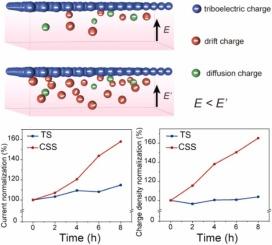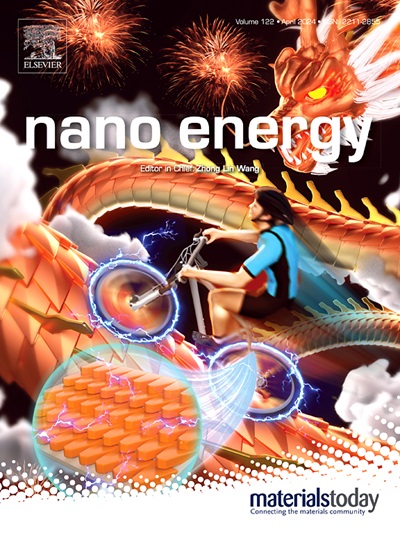提高摩擦纳米发电机体积电荷密度和输出性能的电荷自注入策略
IF 17.1
1区 材料科学
Q1 CHEMISTRY, PHYSICAL
引用次数: 0
摘要
摩擦电纳米发电机(TENG)作为一种从人体和环境中收集能量的可持续动力源,对物联网(IoT)设备和各种广泛分布的传感器的应用具有重要意义。TENG的供电和充电性能在很大程度上取决于其输出功率密度,而输出功率密度又与电荷密度密切相关。本文提出了一种通用的电荷自注入策略,以增加摩擦电荷的存储深度,从而提高TENG的体积电荷密度。这种电荷自注入策略(CSS)通过短路TENG的正负极,有效增强介电层内部的电场,促进摩擦电荷向介电层漂移,从而显著提高体积电荷密度。此外,在间歇工作模式下,通过稳定介电层内部电场,进一步探索电荷漂移过程,进一步提高了体积电荷密度。最后,CSS增强TENG的有效面电荷密度达到93.47 μC/m2,是传统TENG的2.81倍。该策略提高了摩擦电荷的收集效率和输出性能,为TENG在实际应用中提供了更大的发展潜力。本文章由计算机程序翻译,如有差异,请以英文原文为准。

Charge self-injection strategy to enhance the volume charge density and output performance of triboelectric nanogenerator
As a sustainable power source for collecting energy from human body and the environment, triboelectric nanogenerator (TENG) is of great significance for the application of Internet of Things (IoT) devices and every kind of widely distributed sensors. The powering and charging performance of TENG depends largely on its output power density, which is closely related to the charge density. Here, a universal strategy of charge self-injection is proposed to increase the storage depth of triboelectric charges to improve the volume charge density of TENG. This charge self-injection strategy (CSS) effectively enhances the electric field inside dielectric layer by short-circuiting the positive and negative electrodes of TENG, and promotes the drift of triboelectric charge into the dielectric layer, thereby significantly increasing volume charge density. In addition, volume charge density is further enhanced by stabilizing the electric field inside dielectric layer in the intermittent working mode and further exploring the charge drift process. Finally, CSS enhanced TENG achieves an effective areal charge density of 93.47 μC/m2, which is 2.81 times that of traditional-TENG. This strategy improves the collection efficiency of triboelectric charges and output performance, which provides greater development potential for TENG in practical applications.
求助全文
通过发布文献求助,成功后即可免费获取论文全文。
去求助
来源期刊

Nano Energy
CHEMISTRY, PHYSICAL-NANOSCIENCE & NANOTECHNOLOGY
CiteScore
30.30
自引率
7.40%
发文量
1207
审稿时长
23 days
期刊介绍:
Nano Energy is a multidisciplinary, rapid-publication forum of original peer-reviewed contributions on the science and engineering of nanomaterials and nanodevices used in all forms of energy harvesting, conversion, storage, utilization and policy. Through its mixture of articles, reviews, communications, research news, and information on key developments, Nano Energy provides a comprehensive coverage of this exciting and dynamic field which joins nanoscience and nanotechnology with energy science. The journal is relevant to all those who are interested in nanomaterials solutions to the energy problem.
Nano Energy publishes original experimental and theoretical research on all aspects of energy-related research which utilizes nanomaterials and nanotechnology. Manuscripts of four types are considered: review articles which inform readers of the latest research and advances in energy science; rapid communications which feature exciting research breakthroughs in the field; full-length articles which report comprehensive research developments; and news and opinions which comment on topical issues or express views on the developments in related fields.
 求助内容:
求助内容: 应助结果提醒方式:
应助结果提醒方式:


